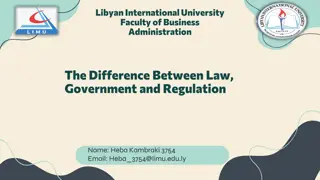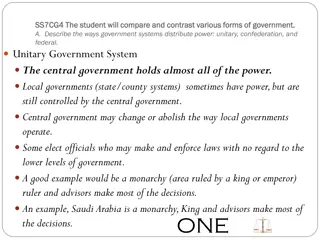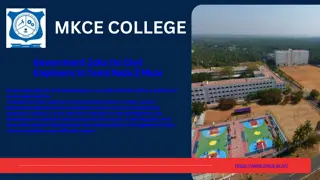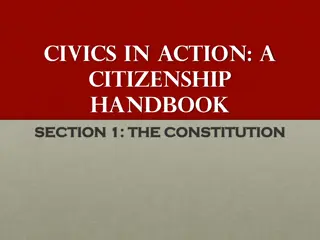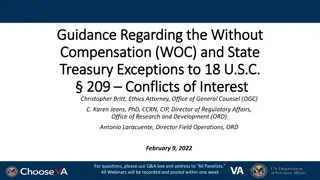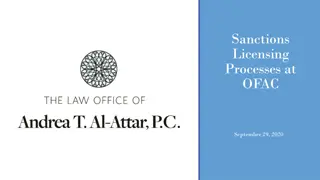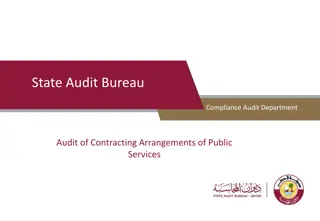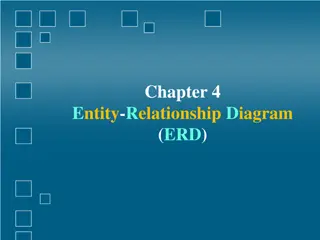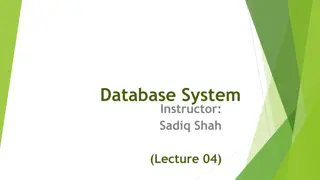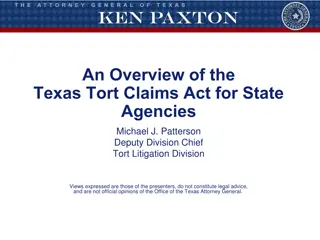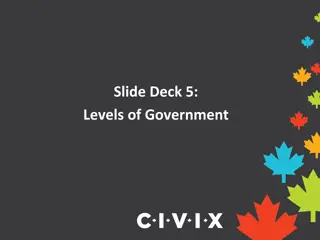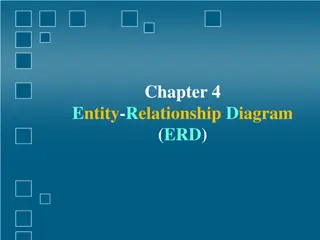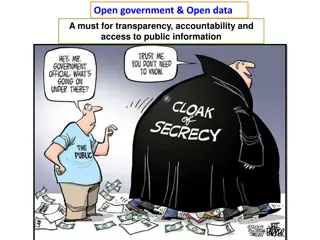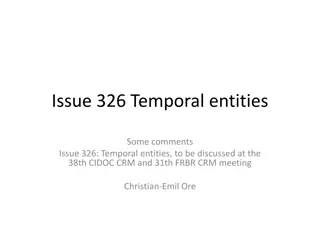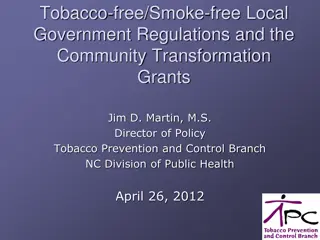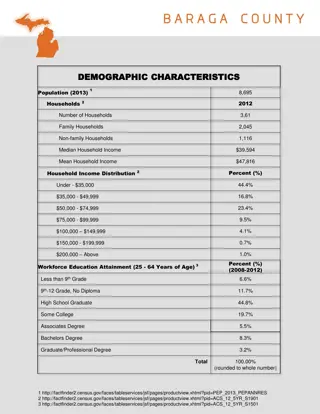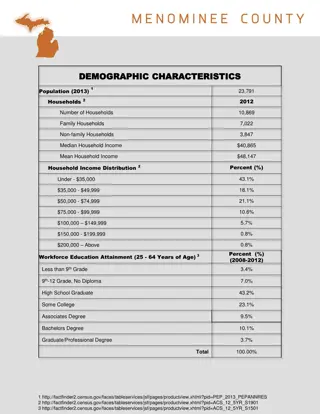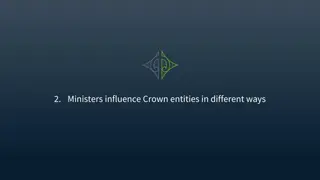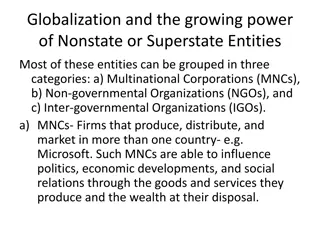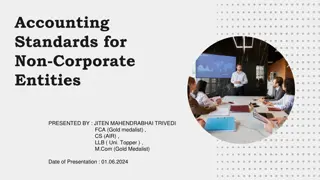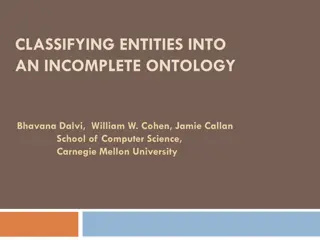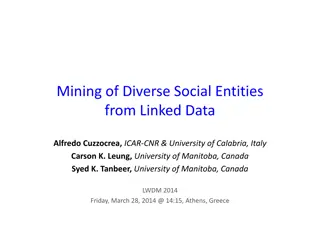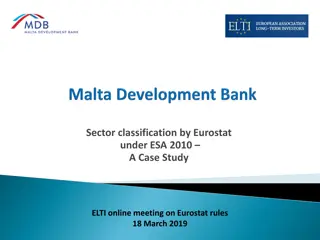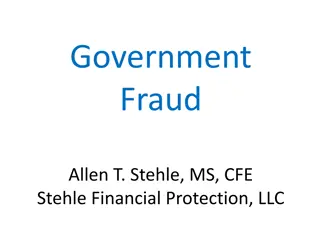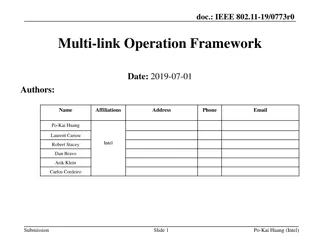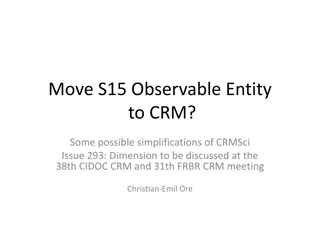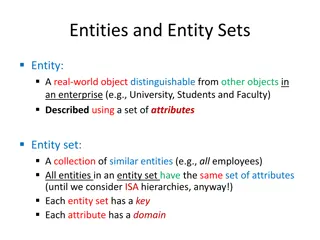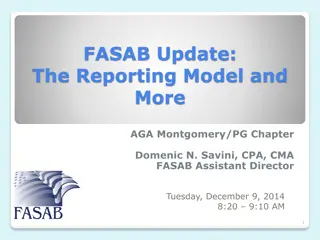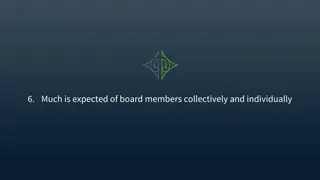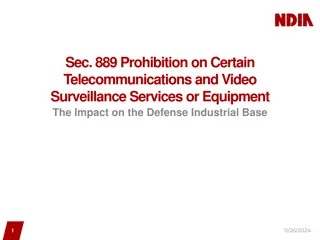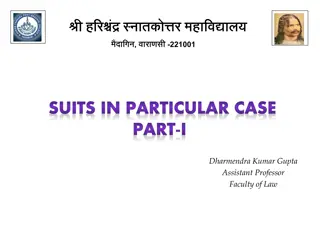Overview of Healthcare and Life Science Market in Saudi Arabia
Saudi Arabia's healthcare and life sciences sectors are a priority, with significant investments and opportunities for firms in medical equipment, pharmaceuticals, and more. The Department for International Trade aims to support UK entities in seizing trade opportunities and fostering a culture of e
1 views • 10 slides
Course Overview: E/Digital Government at UIN SUSKA Riau
Explore the E/Digital Government course offered by the Saide Dept. of Information Systems at UIN SUSKA Riau. The course covers topics such as digital government landscape, historical perspectives, e-government evolution, and digital transformation. Gain insights into digital government maturity mode
2 views • 24 slides
Assessment of South African Government's Implementation of NSP on GBVF
The Commission for Gender Equality (CGE) assessed the government's implementation of the National Strategic Plan on Gender-Based Violence and Femicide (NSP on GBVF) between 2020 and 2022. The study aimed to review policies and practices to promote gender equality and women's rights. The NSP provides
1 views • 17 slides
NOT-FOR- PROFIT MAKING CONCERN
Not-for-profit organizations, such as educational institutions, public hospitals, and charitable trusts, operate with the main objective of providing services rather than making profits. These organizations rely on various sources of funding like contributions, donations, and grants. Accounting for
4 views • 4 slides
Comparison of Business Entities and Collaboration Forms
Various forms of business entities such as sole proprietorship, partnership, limited liability company, state-owned enterprises, cooperatives, etc., each come with their own advantages and disadvantages. Additionally, collaboration forms like joint ventures, mergers, acquisitions, etc., allow busine
0 views • 8 slides
Understanding the Distinction Between Law, Government, and Regulation
Laws, government, and regulations play unique roles in society. Laws are established by governments, regulations enforce laws, and government entities oversee the implementation of both. This presentation delves into their definitions, highlights the differences between them, and emphasizes the crit
3 views • 12 slides
Comparison of Government Systems: Unitary, Confederation, and Federal
The comparison of unitary, confederation, and federal government systems highlights how power is distributed between central and local authorities. In a unitary system, the central government holds most power, while local governments have limited autonomy. In confederation, local governments retain
0 views • 37 slides
Government Jobs for Civil Engineers In Tamil Nadu Mkce
Government Jobs for Civil Engineering:\nGovernment Jobs for Civil engineering is a versatile field that offers a plethora of career opportunities,\nincluding lucrative options in the government sector. In India, various government departments and agencies actively recruit civil engineering graduates
0 views • 2 slides
The Role of DevOps Certifications in Government and Public Sector Projects
Incorporating DevOps methodologies into government and public sector projects can lead to substantial improvements in efficiency, collaboration, and service delivery. DevOps certifications are instrumental in achieving these benefits, providing teams with the skills and knowledge necessary to excel.
3 views • 8 slides
Understanding the Foundation of US Government: The Constitution and its Principles
The Constitution of the United States outlines key principles governing the government, including popular sovereignty, republicanism, limited government, federalism, separation of powers, checks and balances, and individual rights. It establishes six goals for the US government and delineates the po
2 views • 12 slides
Understanding 18 U.S.C. 209 and Its Impact on VA Research Personnel
DOJ guidance clarifies 18 U.S.C. 209 for VA employees receiving compensation from non-Federal entities for VA research, highlighting conflicts of interest and legal implications. This law prohibits Federal employees from receiving any form of compensation from non-Federal entities for services rende
0 views • 20 slides
Sanctions Licensing Processes at OFAC Overview
The Office of Foreign Assets Control (OFAC) administers U.S. economic sanctions against targeted foreign entities. This overview covers OFAC's jurisdiction, licensing authorities, application processes, and tips for interacting with OFAC. Compliance with U.S. primary sanctions is crucial, especially
0 views • 32 slides
State Audit Bureau in Qatar: Ensuring Accountability and Transparency
The State Audit Bureau in Qatar, established in 1973, plays a crucial role in safeguarding public funds, ensuring compliance with laws, and enhancing transparency. Through its audit of contracting arrangements in the public sector, the Bureau aims to improve resource utilization for sustainable deve
0 views • 18 slides
Understanding 18 U.S.C. 209 and Its Impact on VA Research Personnel
DOJ guidance has clarified the application of 18 U.S.C. 209 to VA employees receiving compensation from non-Federal entities for research. This law prohibits Federal employees from receiving any form of compensation from non-Federal entities for services expected as Government employees. The webinar
0 views • 20 slides
Understanding Entity-Relationship Diagrams (ERD) for Database Design
Entity-Relationship Diagrams (ERD) are vital in database design, illustrating entities and their relationships. They help in conceptualizing data models and laying the groundwork for database structures. The process involves identifying entities, defining relationships, and analyzing interactions to
0 views • 40 slides
Understanding Modeling Entities and Attributes in Database Systems
Entities, relationships, and attributes are fundamental constructs in the Entity-Relationship (E-R) model. Entities represent people, places, objects, events, or concepts in a user environment. Each entity type has a set of attributes defining its properties. It is crucial to distinguish between ent
2 views • 17 slides
Understanding the Texas Tort Claims Act for State Agencies
The Texas Tort Claims Act (TTCA) outlines the scope of tort liability for State entities and employees during their state employment. State entities are represented by the Office of the Attorney General, and specific provisions apply to state entities separate from municipalities. This overview cove
0 views • 16 slides
Understanding Government Support Agreements in Infrastructure Projects
Government support agreements play a crucial role in infrastructure projects by outlining various forms of support provided by the government to ProjectCo. These agreements help allocate risks appropriately, ensure credit enhancement, and provide direct or indirect support. However, hindrances such
1 views • 15 slides
Understanding Levels of Government in Canada
A representative democracy in Canada consists of various levels of government, including federal, provincial, municipal, and Indigenous governments. Elected representatives at each level make policy decisions and pass laws on behalf of the citizens. The federal government is led by the Prime Ministe
0 views • 18 slides
Understanding Entity-Relationship Diagrams (ERD)
An Entity-Relationship Diagram (ERD) is a vital data modeling technique for visualizing an information system's entities and their relationships. This graphical representation helps in database design by defining entities, analyzing interactions, and determining cardinality. Entities represent real-
1 views • 40 slides
Open Government Data and Sustainable Development Goals
Open government data and sustainable development goals go hand in hand, promoting transparency, accountability, and access to public information. Openness in data allows for universal participation, interoperability, and value creation. By striving for sustainable development and embracing open gove
2 views • 24 slides
Discussion on Temporal Entities and Simultaneity in CIDOC CRM Meeting
Temporal entities and the modeling of simultaneity in CIDOC CRM are under discussion at the upcoming meeting. The current approach considers the cardinality of certain relations, aiming to streamline the representation of time-spans and spacetime volumes. The evolving perspectives on the spatial com
3 views • 5 slides
Local Government Regulations on Tobacco and Smoke-Free Policies
Local government regulations play a significant role in creating smoke-free and tobacco-free environments. G.S. 130A-498 grants local governments the authority to regulate smoking in government grounds and enclosed public places. Entities like City Councils and Airport Authorities can implement laws
0 views • 23 slides
Demographic and Government Overview of L'Anse and Baraga, Michigan
An overview of the demographic characteristics and government structures of L'Anse and Baraga, Michigan. The population, household statistics, income distribution, and workforce education levels are highlighted for L'Anse. The city government structures of L'Anse and Baraga, including village truste
1 views • 10 slides
Demographic and Government Overview of Menominee, Michigan
Menominee, Michigan, has a population of 23,791 as of 2013, with a median household income of $40,865. The city government is structured with a mayor and city council, while the county government is led by a board chairman and commissioners. The state government representation includes state senator
1 views • 11 slides
Ministers' Influence on Crown Entities through Strategic Processes
Ministers influence Crown entities by appointing effective boards, engaging in dialogue, participating in strategic planning, and ensuring continuous improvement. They make appointments, hold meetings, receive regular performance reports, and guide entities in setting strategic directions. Through f
0 views • 11 slides
Globalization and the Influence of Nonstate Entities
Globalization is shaped by the power of Multinational Corporations (MNCs), Non-governmental Organizations (NGOs), Inter-governmental Organizations (IGOs), and technological advancements. These entities wield influence on politics, economics, and social dynamics globally. The authority and legitimacy
0 views • 4 slides
Accounting Standards for Non-Corporate Entities Overview
Introduction to accounting standards for non-corporate entities such as partnerships, LLPs, trusts, and nonprofits. Explanation of the applicability of accounting standards based on business size and the classification of Level I, II, III, and IV entities by ICAI. Details of the ICAI announcement da
0 views • 14 slides
Classifying Entities into an Incomplete Ontology: Exploratory EM Approach
The research discusses methods for hierarchical classification of entities into incomplete ontologies. It explores the challenges of evolving web-scale datasets and the need for classifying entities in an incomplete ontology structure. The Hierarchical Exploratory EM model is detailed, providing ins
0 views • 27 slides
Diverse Social Entities Mining from Linked Data in Social Networks
This research focuses on mining diverse social entities from linked data in social networks using a DF-tree structure and DF-growth mining algorithm. The study explores the extraction of important linked data in social networks and the mining of various social entities such as friends. Prominence va
0 views • 13 slides
Understanding Eurostat Classification and Government Guarantees in Financial Institutions
In this case study, Eurostat's classification of the MDB outside the general government sector is explored. The focus is on government guarantees, financial intermediary risks, and the implications outlined in the Eurostat Manual on Government Deficit and Debt under ESA 2010. The MDB's position rega
1 views • 30 slides
Understanding Government Fraud: Impacts and Prevention
Government fraud is a serious issue that impacts public trust and financial stability. This type of fraud involves intentional acts to deceive the government and can occur internally or externally. The public perception of government organizations is affected by fraud, and entities such as the U.S.
1 views • 50 slides
IEEE 802.11-19/0773r0 Multi-link Operation Framework Summary
The document discusses the multi-link operation framework for IEEE 802.11-19/0773r0, focusing on load balancing and aggregation use cases. It introduces terminology related to multi-link logical entities and provides examples of multi-link AP and non-AP logical entities. The framework considers stee
0 views • 16 slides
Comparison of Observable Entities in CRM and CRMSci
In this content, different aspects of observable entities in CRM and CRMSci are discussed, including measurements, assignments, simplifications, and adjustments. The evolution and implications of observable entities within these frameworks are explored through various dimensions and properties, shed
0 views • 7 slides
Requirements for Managing Entities in Health Systems
Grant agreements and payments of federal and state financial assistance require compliance with specific statutory authorities. Managing entities must follow guidelines for reporting and reconciling funds, with a focus on transparency and accountability. Providers are required to complete specific s
0 views • 15 slides
Understanding Entities and Relationships in Database Design
Explore the concepts of entities, entity sets, attributes, key attributes, single-valued and multi-valued attributes, derived attributes, as well as relationships and relationship sets in the context of database design. Gain insights into distinguishing between regular entities, weak entities, and e
0 views • 24 slides
FASAB Update: The Federal Reporting Entity Proposal
Discussions on the Federal Accounting Standards Advisory Board (FASAB) update regarding the reporting model, including proposals for the General Purpose Federal Financial Reports (GPFFR) and the distinction between consolidation entities and disclosure entities. The presentation covers principles of
0 views • 31 slides
Expectations and Responsibilities of Board Members in Statutory Entities
Board members of statutory entities are collectively expected to ensure consistent and effective entity performance, financial responsibility, and collaboration. Individually, they must act with integrity, comply with legislation, and avoid conflicts of interest. Boards have a crucial role in monito
0 views • 5 slides
Understanding the Impact of Section 889 on Defense Industrial Base
Section 889, passed as part of the 2019 NDAA, restricts the US government from contracting with entities using certain telecommunications and video surveillance equipment. It aims to strengthen the defense supply chain by prohibiting direct procurement or contracts with entities utilizing covered eq
0 views • 17 slides
Lawsuits Against the Government – Rules and Procedures
This comprehensive article discusses various aspects of lawsuits against the government, including the specific rules and procedures involved in such cases. It covers important topics such as suits by or against the government, notice requirements, exceptions for urgent relief, and where notices sho
0 views • 13 slides





